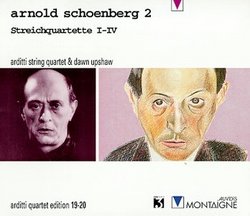| All Artists: Arnold Schoenberg, Arditti String Quartet, Dawn Upshaw Title: Arnold Schoenberg 2: String Quartets 1-4 - Arditti String Quartet / Dawn Upshaw Members Wishing: 0 Total Copies: 0 Label: Disques Montaigne Release Date: 12/6/1994 Album Type: Box set Genre: Classical Styles: Opera & Classical Vocal, Chamber Music, Historical Periods, Classical (c.1770-1830) Number of Discs: 2 SwapaCD Credits: 2 UPCs: 093046950422, 3298497820240 |
Search - Arnold Schoenberg, Arditti String Quartet, Dawn Upshaw :: Arnold Schoenberg 2: String Quartets 1-4 - Arditti String Quartet / Dawn Upshaw
 | Arnold Schoenberg, Arditti String Quartet, Dawn Upshaw Arnold Schoenberg 2: String Quartets 1-4 - Arditti String Quartet / Dawn Upshaw Genre: Classical
|
Larger Image |
CD Details |
CD ReviewsHauntingly beautiful Joseph S. Barrera III | San Francisco, CA USA | 04/07/1999 (5 out of 5 stars) "I love these quartets, and I listen to them for their deep beauty. This recording is such an important part of my collection that I am buying a second copy because there is a skip on the second CD (from careless handling... sigh). Regarding denisdiderot's comments, I offer in rebuttal the following quote, from "Schoenberg the Romantic" "On the surface, most of his music appears to be a complete departure from anything previously written, utilizing bizarre harmonies, unresolving dissonances, extreme dynamics, and disjunct melodies. However, a closer look reveals that not only does Schoenberg cling to the musical ideals of the Romantic era, but also that his predecessors, including Brahms, Wagner, Mahler, Strauss, and even Beethoven, already had begun to develop the stylistic techniques which Schoenberg's audiences found so shocking. Schoenberg took these beginnings of a style, which later became known as expressionism, and simply brought them to their logical conclusion by destroying tonality. In the period between the destruction of tonality and the development of the twelve-tone method, Schoenberg created works which look to Romantic ideals for their structure, yet which deny one of the most important parts of this Romantic structure, tonality, since he thought Wagner had exhausted the possibilities of tonality in Tristan and Isolde."" Classic quartets beautifully played Karl Henzy | 05/10/1999 (5 out of 5 stars) "It's really difficult to understand DenisDiderot's hostility for this music. If he doesn't like atonality, why did he buy a two-disc Schoenberg set? One could easily say something about such conservative musical taste reflecting an uptight stance to life, but really, I just feel sorry for people who can't enjoy the beauty, power, depth of such music, played so brilliantly by the extraordinary Arditti Quartet." Schoenberg could compete Karl Henzy | 05/02/2000 (5 out of 5 stars) "Diderot did not listen to the first quartet well enough. Schoenberg almost brought the romantic period to a thundering close with it. But the atonal quartets are the best. They are a treasure trove of sounds waiting to be heard for the first time. Even after the 50th hearing, there are still things I've missed. I like the lyrical quality of these quartets the best; a trait the Arditti Quartet brings out well."
|

 Track Listings (8) - Disc #1
Track Listings (8) - Disc #1